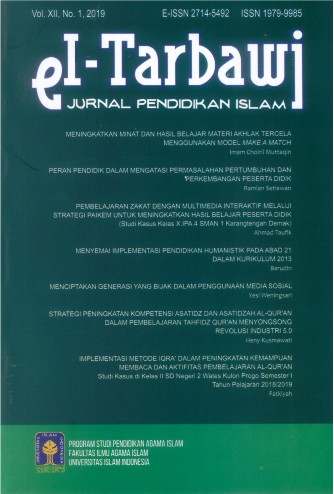Main Article Content
Abstract
Abstract
The success of the teaching and learning process in the classroom is very much determined by the learning strategy. Therefore, each teacher should implement certain strategies or methods of learning.
This research is based on the problems: (a) how to improve the ability to read the Qur'an with the Iqra’ method? (b) What is the effect of the Iqra’ method on students’ quranic reading ability and learning activities? The objectives of this study are: (a) To know students’ ability to read the Qur’an after the implementation of the Iqra’ method (b) to know the effect of student motivation after applying the Iqra’ method.
This is action research which consists of three rounds activities. Each round consists of four stages: design, activity and observation, reflection, and refinement. The target of this research is grade II students. The data obtained are in the form of the results of formative tests, observations of teaching and learning activities.
The result found that the students’ ability to read Al-Qur'an increases from cycle I to cycle II: cycle I (70.37%), cycle II (77.77%).
The conclusion from this study is that the Iqra’ method can positively influence the ability to read the Qur'an and student learning activities, and this learning model can be used as an alternative to PAI learning.
Keywords: Al-Qur'an, Reading, Iqra’, Students’ Ability, Learning Activities.
Article Details
Authors retain copyright and grant the journal right of first publication with the work simultaneously licensed under a Creative Commons Attribution (CC-BY-SA) 4.0 License that allows others to share the work with an acknowledgment of the work’s authorship and initial publication in this journal.
